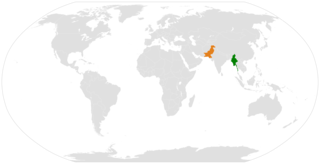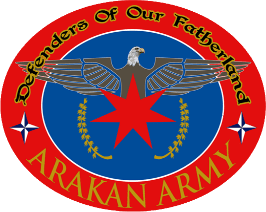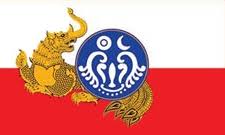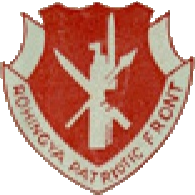
Rakhine State, formerly known as Arakan State, is a state in Myanmar (Burma). Situated on the western coast, it is bordered by Chin State to the north, Magway Region, Bago Region and Ayeyarwady Region to the east, the Bay of Bengal to the west and the Chattogram Division of Bangladesh to the northwest. It is located approximately between latitudes 17°30' north and 21°30' north and longitudes 92°10' east and 94°50' east. The Arakan Mountains or Rakhine Yoma separated Rakhine State from central Burma from North to South. Off the coast of Rakhine State there are some fairly large islands such as Ramree, Cheduba and Myingun. Rakhine State has an area of 36,762 square kilometres (14,194 sq mi) and its capital is Sittwe.

The Rohingya people or historically called Arakanese Indians are a stateless ethnic group who predominantly follow Islam and reside in Rakhine State, Myanmar. Before the Rohingya genocide in 2017, when over 740,000 fled to Bangladesh, an estimated 1.4 million Rohingya lived in Myanmar. Described by journalists and news outlets as one of the most persecuted minorities in the world, the Rohingya are denied citizenship under the 1982 Myanmar nationality law. There are also restrictions on their freedom of movement, access to state education and civil service jobs. The legal conditions faced by the Rohingya in Myanmar have been compared to apartheid by some academics, analysts and political figures, including Nobel laureate Bishop Desmond Tutu, a South African anti-apartheid activist. The most recent mass displacement of Rohingya in 2017 led the International Criminal Court to investigate crimes against humanity, and the International Court of Justice to investigate genocide.

Islam is a minority religion in Myanmar, practised by about 2.1% of the population, according to the 2014 Myanmar official statistics.
In Myanmar, terrorism is defined by the country's counter-terrorism law and its subsections, which is interpreted by the Anti-Terrorism Central Committee and enforced by the government of Myanmar. Two groups are currently listed as terrorist organisations in accordance with Myanmar's counter-terrorism law; the Arakan Rohingya Salvation Army (ARSA), which was added on 25 August 2017, and the Arakan Army, which was added on 18 January 2019. The SPDC military government called the Vigorous Burmese Student Warriors (VBSW) "terrorists" after their role in the 1999 Myanmar Embassy siege, but the group was never legally declared as such.

Myanmar has been embroiled in armed conflict since 1948, when the country, then known as Burma, gained independence from the United Kingdom. The conflict has largely been ethnic-based, with ethnic armed organisations fighting Myanmar's armed forces, the Tatmadaw, for self-determination. Despite numerous ceasefires and the creation of autonomous self-administered zones in 2008, armed groups continue to call for independence, increased autonomy, or the federalisation of Myanmar. It is the world's longest ongoing civil war, spanning almost eight decades.

Rohingya people in Pakistan are a community based in Karachi, Sindh, Pakistan. They are Rohingya Muslims, an ethnic group native to Rakhine State, Myanmar, who have fled their homeland because of the persecution of Muslims by the Burmese government and Buddhist majority. According to varied Pakistani government sources and the Arakan Historical Society, there are some 200,000 Rohingya refugees residing in Pakistan. All of them have made a perilous journey across Bangladesh and India and have settled in Karachi. A report on human trafficking stated that Burmese people make up fourteen per cent of Karachi's undocumented immigrants. Large scale Rohingya migration to Karachi made Karachi one of the largest population centres of Rohingyas in the world after Myanmar. In the recent years, scores of Burmese women seeking employment have entered the country. Different resources cite the number of these women to be in the thousands.

The Rohingya conflict is an ongoing conflict in the northern part of Rakhine State, Myanmar, characterised by sectarian violence between the Rohingya Muslim and Rakhine Buddhist communities, a military crackdown on Rohingya civilians by Myanmar's security forces, and militant attacks by Rohingya insurgents in Buthidaung, Maungdaw, and Rathedaung Townships, which border Bangladesh.

The Arakan Army, sometimes referred to as the Arakha Army, is an ethno-nationalist armed organisation based in Rakhine State (Arakan). Founded in April 2009, the AA is the military wing of the United League of Arakan (ULA). It is currently led by Commander-in-Chief Major General Twan Mrat Naing and vice deputy commander-in-chief Brigadier General Nyo Twan Awng. It is the military wing of the Rakhine ethnic people in Rakhine state where they are the majority. They seek greater autonomy from the Myanmar's central government and wants to restore the sovereignty of Arakan people. It was declared a terrorist organization in 2020 by Myanmar, and again by the State Administration Council junta in 2024.

The Arakan National Party, is a political party in Myanmar (Burma), representing the interests of the Rakhine people in Rakhine State and Yangon Region. The party was founded on 13 January 2014 and registered with the Union Election Commission on 6 March 2014. The chairman of the ANP is Thar Htun Hla. The party is known for its hardline ethnic nationalist stance, as well as its Islamophobic and anti-Rohingya positions. Some members of the party were involved in instigating violence against Rohingya people during the communal riots in 2012, which left dozens dead and thousands homeless.

The Rohingya Solidarity Organisation (RSO) is a Rohingya insurgent group and political organisation. It was founded in 1982 following a large scale military operation conducted by the Tatmadaw. The group discontinued its armed rebellion in 1998 but rearmed shortly after the 2021 Myanmar coup d'etat.
The Rohingya National Army (RNA) was a Rohingya insurgent group active in northern Rakhine State, Myanmar. It was the armed wing of the Arakan Rohingya National Organisation.

The Arakan Rohingya National Organisation (ARNO) is a Rohingya political organisation based in London, United Kingdom.

The Rohingya Patriotic Front (RPF) was a political organisation headquartered in Cox's Bazar, Bangladesh. The RPF had a small and poorly armed insurgent army of 70 fighters, who were active along the Bangladesh–Burma border and in northern Arakan, Burma. The goal of the RPF was to create an autonomous Muslim zone for the Rohingya people.
The Arakan Rohingya Islamic Front (ARIF) was a Rohingya insurgent group active in northern Rakhine State, Myanmar (Burma). The group was made up of Rohingya fighters led by Nurul Islam, a Yangon-educated lawyer. The group was created after uniting the remnants of the Rohingya Patriotic Front (RPF) and a defecting faction of the Rohingya Solidarity Organisation (RSO) that was under the command of Nurul Islam.
Nurul Islam is a Rohingya political activist and Yangon-educated lawyer from Myanmar (Burma). He is the president of the Arakan Rohingya National Organisation (ARNO) and lives with his family in London, the United Kingdom.

The Arakan Rohingya Salvation Army (ARSA), formerly known as Harakah al-Yaqin, is a Rohingya insurgent group active in northern Rakhine State, Myanmar. According to a December 2016 report by the International Crisis Group, it is led by Ataullah abu Ammar Jununi, a Rohingya man who was born in Karachi, Pakistan, and grew up in Mecca, Saudi Arabia. Other members of its leadership include a committee of Rohingya émigrés in Saudi Arabia.

The Rohingya genocide is a series of ongoing persecutions and killings of the Muslim Rohingya people by the military of Myanmar. The genocide has consisted of two phases to date: the first was a military crackdown that occurred from October 2016 to January 2017, and the second has been occurring since August 2017. The crisis forced over a million Rohingya to flee to other countries. Most fled to Bangladesh, resulting in the creation of the world's largest refugee camp, while others escaped to India, Thailand, Malaysia, and other parts of South and Southeast Asia, where they continue to face persecution. Several countries consider these events ethnic cleansing.

Violent clashes have been ongoing in the northern part of Myanmar's Rakhine State since October 2016. Insurgent attacks by the Arakan Rohingya Salvation Army (ARSA) have led to sectarian violence perpetrated by Myanmar's military and the local Buddhist population against predominantly Muslim Rohingya civilians. The conflict has sparked international outcry and was described as an ethnic cleansing by the United Nations High Commissioner for Human Rights. In August 2017, the situation worsened and hundreds of thousands of refugees fled Myanmar into Bangladesh, with an estimated 500,000 refugees having arrived by 27 September 2017. In January 2019, Arakan Army insurgents raided border police posts in Buthidaung Township, joining the conflict and beginning their military campaign in northern Rakhine State against the Burmese military.
Ataullah abu Ammar Jununi is the leader of the Arakan Rohingya Salvation Army (ARSA), a Rohingya insurgent group active in northern Rakhine State. Ataullah appears in several videos released online by ARSA, where he gives press statements and speeches.

The United League of Arakan is an Arakanese political organisation based in Laiza, Kachin State, Myanmar. Its armed wing is the Arakan Army. Major General Twan Mrat Naing is the ULA's chairman and Brigadier General Nyo Twan Awng is in the secretary. The United League of Arakan is the member of the Federal Political Negotiation and Consultative Committee (FPNCC), the political negotiation team formed by seven ethnic armed groups in Myanmar.














